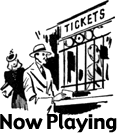
![]()

| This week: |
Filthy says: |
| The one thing movies about drunks forget is the hope. Most flicks make it look like it's all miserable: your life comes down like pants from a 99-cent store; everyone who loves you takes a bullet train out of town; and your kidney fades faster than a Ray-o-Vac battery. According to the movies, there is no upside to enjoying a few pints of whiskey every day, and nothing romantic when you turn your back on a pay-you-back last call. Take it from me, that's not how getting loaded is. Sure, there are mornings you wake up in the dumpster behind the Country Buffet, and nights when someone you can't remember scribbled an epithet on your forehead with a Sharpie and you don't erase it for a few days because you want to know what it says but can't read it backward in the mirror. Then there's the throwing up, the hangovers and being able to stick a finger into your gut so deep it pushes clear through the gelatinous mass that once was your liver. Still, drunkenness gives you hope, it gives you dreams and it gives you courage. Even a quart of rubbing alcohol and a packet of Hi-C powder makes for a much better evening than sitting alone thinking about how you said you were going to paint over the mold on the walls eight years ago but still haven't gotten around to it. It's better than noticing that the broken spring in the Goodwill sofa has punched through the comforter you tossed on after it tore the upholstery. I can't tell you all the magical places alcohol has taken me, only partially because I can't remember some of them. I believe it's better to have an adventure and not remember it than to stay home and wish for one. Alcohol, as maligned as it is, has always had an important role in our society: to make the intolerable seem all right, and the future look brighter than it really is. It is for many of us, the best reason to get up in the morning and the last thing we talk to--or sing to or claim is the only thing that understands us--before we go to bed. In the long term it may fuck up your life. But a lot of the time the right-now is all that's important. As a song in Crazy Heart goes: "Sometimes falling feels like flying, for a little while." Crazy Heart is a bad-man-redeemed-by-a-good-woman movie. There is little surprising or original about its story. It owes a shitload to the similar early-80s flick Tender Mercies. It even employs Tender Mercies' star Robert Duvall in a cameo and as a producer. Crazy Heart is done exceptionally well, though, and it understands that drunks are functional, drink for a reason and aren't demons. It's a God damn good movie. Jeff Bridges is Bad Blake, an old-school country-western singer down on his luck, like if Johnny Paycheck were still on the road. He's a hard drinker/lover/iconoclast who's seen his career go from big stages to the back of bowling alleys and storefront bars in the Southwest. He tours the wide-open West, among the plateaus and red rocks, in a beat-up Suburban, drinking pricey whiskey as though the quality of the booze defines the dignity of the alcoholic. He drinks a lot of it: a quart before Showtime and another after. Puking is as regular as a German clock, as is drifting off in a lousy motel somewhere with a smoke dangling from his fingers. While Bridge's career falls, a kid who once backed him up rises. That kid, played by Colin Farrell, is one of those newfangled country singers with a ponytail, four tour buses and no real-life experience on which to base his songs about heartbreak and loss. At the start of the movie, Bridges is expecting a favor from Farrell to save him from the poorhouse and having to switch his hooch loyalty to low-grade booze like Canada House or Black Velvet. Bridges is on the tail end of middle age when he falls in love with a much younger journalist (Maggie Gyllenhaal) who has a four-year-old son and a penchant for liking the wrong sort of man. Of course, it's her love that inspires him to be a better person, to give up the bottle and stop loathing himself. As happens in these movies, just when shit looks good, he shows his irresponsibility and selfishness to Gyllenhaal. She dumps his drunken ass, and his love for her forces him to finally face his failing health and the limited options he has if he keeps falling asleep with an empty bottle of whiskey. Before her he'd have been happy hard-living himself into the grave. Crazy Heart has some shortcomings. All of them are small compared to what it does well. The main one is that I don't understand why Gyllenhaal lets Bridges into her life. She says she's lousy at picking men, but why a washed-up drunkard, broke musician? The movie could have given an answer I'd buy, but it doesn't. The ease with which a smart person lets such a bum into her life is unheard of outside of my own marriage. A lot of the secondary characters aren't consistent, or even necessary. Farrell's Tommy Sweet is needed, but about as predictable as can be. Bridges' bar-owning pal is an odd choice to guide him to sobriety. The terrifying event that causes Gyllenhaal to reconsider her feelings is too convenient and not entirely convincing. It's the type of event that can only end one way, because moviemakers usually don't have the balls to do it any other. Finally, Bridges' rehabilitation is awfully hurried at the end of the film. It's void of any uncertainty or the true difficulty of giving up the bottle. His recovery ties the story together nicely, but it's facile how little time is given to it. The rest of Crazy Heart is pretty fucking terrific. Bridges' performance is flat-out amazing. I went in thinking, how damn hard is it to act like a drunken singer? A role like that is the Oscar-bait actors love, where they can act sad and lost, maybe even cry a bit. Yet, Bridges does it so damn graceful and elegant. He embodies and fills his character, making him human in a beautifully natural way. His Bad Blake is worn in and broken down, egoless and bristly. He wears those weird gray polyester jeans that pan-assed cowboys wear with their nudie shirts. He has a slow gait and big gut. He wears aviator glasses he occasionally has to retrieve from the trash after puking. He knows his life is falling apart, yet there's something hopeful about him. He likes drinking, because drinking is the best way to make him enjoy his otherwise crummy life. He also likes performing and watching telenovelas (most likely for the same reason as me - all the hot-looking girls). Ultimately, he's pragmatic and hopeful. And rather than rely on a handout, he rediscovers that experience counts for something. I'm no expert on country-western music outside of knowing I hate the shit on the radio today. The music in Crazy Heart feels like it came from the 70s, when there was crossover between cowboys and rock, not only in the music but the lifestyles. Waylon, Johnny and Merle all had their drinking, drugs and hotel-smashing problems. Bad Blake's old hits sound like real relics that era. The movie takes place in wide-open spaces. I'm a sucker for huge vistas of Southwestern mesas and tumbling tumbleweeds. There's a lonely phone booth in the middle of nowhere that sort of look like it ought to be there. Bridges sleeps in a string of motels that were probably grand before interstates and air travel. The rooms have bucking bronco paintings on the walls and heavy Mission-style furniture that was probably grand in its day. I could almost smell the old varnish, puke, sweat and cigarettes lit off the end of the last one. The setting and music add authenticity that supports what I think is Crazy Heart's best virtue: it's small. This is a story about one guy, it's not conflating that into some bigger parable about society or war. Writer/Director Scott Cooper spends his time telling the audience about Bad Blake and his small-and-getting-smaller world. Cooper does it with compassion and respect for the characters. Cooper, Bridges and Gyllenhaal treat the characters were real people. Crazy Heart is a pretty fucking good movie. It has its little problems, sure, but it also has a shitload of hope and a sincerity that exposes the difference between telling a story you love and just cranking out some shit you expect someone else to love for you. Plus, all the drinking onscreen made me kind of thirsty. Four Fingers. |
 |
|
Jeanne Wolf of Parade Valentine's Day is "Hilarious, charming and irresistible!" Realy, Jeanne? Want to bet? |
|
Listening
to |





